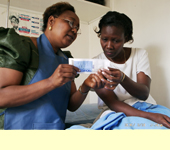
Scaling-Up Postabortion Care Services
“The other sisters were against postabortion care services until they saw the way a client presented herself, bleeding and in pain. Following the procedure the patient was very happy and cured. Now the sisters have changed their minds.”
Trained in postabortion care (PAC) through the PRIME II Project, Sister Mary Njuguna is a nurse-midwife and a Catholic nun, working at the Mother Amadeus Mikindani Maternity Home in Coast Province, Kenya. After she managed her first PAC client, Sister Njuguna convinced her fellow nuns that manual vacuum aspiration is an appropriate procedure for treating women suffering potentially life threatening complications from unsafe or incomplete abortion.
In addition to treatment of complications, PRIME’s program to scale-up PAC services in Coast Province emphasizes family planning counseling and services to help women space births and prevent future unwanted pregnancies. Sister Njuguna’s facility offers counseling for birthspacing and natural family planning methods but does not offer modern methods of contraception, so she arranged to refer postabortion women to a nearby municipal clinic for further counseling and services.
PRIME’s work in Coast, carried out in support of the USAID bilateral Amkeni initiative, builds on the Project’s successful PAC program in Central, Rift Valley and Nairobi provinces. An evaluation of that program, which trained more than 230 private-sector nurse-midwives from 1999 to 2002, confirmed that primary-level providers deliver high-quality PAC services.
In Coast, the demographics and health care infrastructure called for a strategy that includes training primary providers at selected facilities that serve Catholics and a large Muslim population. Representatives from the Islamic Council of Imam and the Catholic Church participated in PAC stakeholders’ meetings organized by PRIME to foster support for PAC and build partnerships between providers and the communities they serve.
Like Catholics such as Sister Njuguna, providers who are Muslim are finding PAC services in accordance with their religious beliefs. “I am proud to have received PAC training,” says Salama Said, a nurse-midwife at the Fatima Medical Clinic in Mombasa. “From the Muslim point of view, PAC does not interfere with my religion. I am only helping and saving lives. My community appreciates the services. My clients are 99% Muslim, and they are now taking family planning methods, which I buy from Marie Stopes International for a reasonable price.”
The 92 nurse-midwives and clinical officers in Coast trained in PAC by PRIME as of December 2003 serve rural areas of the province where journeying to a hospital may be difficult, as well as the provincial capital, Mombasa, a sprawling seaport whose hospitals are overburdened.
“Training private providers in PAC has helped us in the hospitals in that we no longer receive many patients with complications,” affirms Dr. Jane Othigo, the provincial Reproductive Health Specialist. “Patients can now go to the clinics and are managed. The hospitals are there now only for very complicated cases.”
Although PRIME has found the pace of PAC implementation slower in Coast than in the other provinces, preliminary results from the program are encouraging. From January through November 2003, 329 postabortion care clients were managed at 52 facilities, with 220 (67%) receiving a family planning method.
“PAC is very good,” sums up Sister Njuguna. “And I am encouraged because following training one can help clients who are suffering and they don’t need to be referred to hospital. I would encourage other providers to be trained.”
The PRIME II Project, funded by USAID and implemented by IntraHealth International and the PRIME partners, works around the world to strengthen the performance of primary providers as they strive to improve family planning and reproductive health services in their communities.
PRIME Voices #26, Kenya: Scaling-Up Postabortion Care Services, 1/28/04.
|











